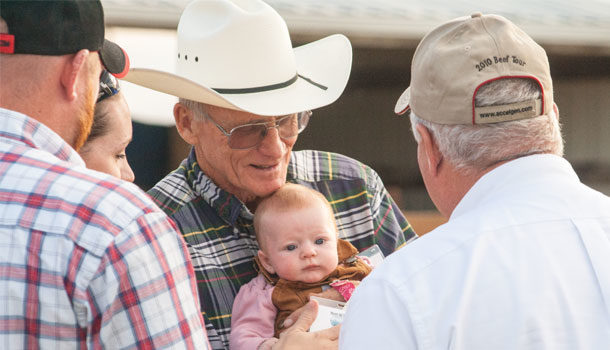Transition planning is not often a pleasant experience, and for many operations, transitioning management and ownership from one generation to the next creates many uncomfortable situations.
Family dynamics impact the success of a family business, explained Mike McGrann at the 2015 Pennsylvania Dairy Summit earlier this year. When transitioning the business management and ownership, producers have many goals – some simple and some very complex. Among them are:
1. They want to continue a legacy.
2. They want the next generation to thrive and grow in the business and in the industry.
3. They want to uphold family values. They don’t want to sacrifice relationships in the transition process.
The technical aspects of transition planning, such as financial, legal and structural, are relatively easy. Emotions from both sides make transition planning very personal and cloud the process.
The outgoing and incoming generations will both have to make sacrifices in order to make the management and ownership transitions successful. McGrann asks the senior generation, “Are you willing to separate your goals and wishes from what the next generation wants?”
McGrann explained, “We want the next generation to walk in our shoes, and we expect them to tie them the same and do everything identically.” He explained that thinking this way just isn’t feasible, and expecting the operation and decisions to be exactly the same does not allow the next generation to thrive.
Honest and effective conversations
Leadership transition must start with a planning process that develops in a safe environment. Establishing an environment where all participants can talk freely and voice opinions without being harshly judged or dismissed altogether will help to carry out the process more effectively.
McGrann encourages farm owners, family members and employees, “Invest in relationships as early as possible. The power to influence the people around you is not determined by your title of ‘boss,’ ‘mom,’ or ‘dad,’ but by the strength of your relationships.”
“Create synergy between the family, individuals and the farm,” he said. By establishing these relationships and encouraging healthy family dynamics, the farm will be positively impacted, and the operation will run more smoothly.
Plan for the future
It continues to be increasingly important to develop multigenerational plans that will continue an enterprising legacy. Begin the early stages of planning with lots of questions. McGrann uses a simple activity during transition meetings where he asks each person to write down a newspaper headline to describe their livelihood in five or 10 years.
He challenges those involved in the transition process to think about their career path and role they would like to hold in the future. Details such as the acreage of farmland, herd sizes and economics are very important. Family dynamics and future business planning is also important to incorporate into the discussion.
Don’t allow emotionsto cloud the process
Leadership isn’t just a technical skill; it’s emotional and reactive. McGrann further explained when and where it is and is not appropriate to allow emotions to lead the conversation.
People inherently overanalyze simple comments and lend themselves to a reaction that doesn’t fit into the situation. This leads to more conflict during the transition conversation.
Avoid carrying around past issues and allowing small comments or assumptions to build upon one another. There aren’t always underlying meanings regarding comments from either side of the conversation.
McGrann gave an example regarding something as simple as a father asking his son for a wrench. Instead of simply handing over the wrench, the son may think, “Why does he have to micromanage? Why does he think I’m lazy?”
While it may seem like an exaggerated concept, it’s a common occurrence in the workplace, especially during stressful times when emotions are heightened.
Instead, try to think positively. When dealing with an employee who’s opinionated and overconfident, try to focus on the positive attributes of the situation. The employee is also ambitious and excited to contribute to the overall success on the farm.
Provide and accept feedback
When receiving feedback, understand your strengths and weaknesses so you can work to improve them instead of rejecting the feedback by defending yourself.
As a person administering feedback, be sure to provide both negative and positive information. Provide suggestions on how they can improve their weaknesses. If you find faults in your own personal management of the operation, admit those weaknesses and explain how you plan to improve upon them.
Transition planning can be a difficult process, but once it is done, it can be a rewarding experience. Transition leadership in a family business is the most difficult type of transition because it affects family dynamics and threatens to pull apart relationships with very strong, life-long, emotional connections.
Before making any brash decisions in the planning process, McGrann advises producers and business owners, “Acknowledge your own humanity. Accept the reality that no one is perfect and everyone makes mistakes.”
He pushes producers on both sides of the transition table to be positive and to maintain their core values while also accepting the values of the other party. Instead of being aggressive with your values and ideas, be assertive and have an honest conversation to promote and explain your views.
McGrann explained that a successful transition process plan can be accomplished by focusing on healthy relationships and encouraging positive and effective interactions.
By maintaining these healthy relationships, together outgoing generations, incoming generations, family members and employees will be able to challenge the future and create multigenerational plans for long-term success in the industry. PD
Sara Kitchen is a Penn State student and a freelance writer based in State College, Pennsylvania.
PHOTO
Photo byPDstaff.







